Professional Identity and Practice Report: Hilton Hotel, BTEC HND
VerifiedAdded on 2023/01/19
|18
|5506
|60
Report
AI Summary
This report delves into the multifaceted aspects of professional identity and practice within the hospitality industry, utilizing Hilton Hotel as a case study. The report begins by defining professional identity and practice, emphasizing the significance of continuous professional development (CPD) for various stakeholders, including investors, employees, and managers. It then investigates the skills and competencies expected by employers for specific job roles within Hilton, such as chefs and waiters, outlining both hard and soft skills, and health and safety aspects. A SWOT analysis is conducted to assess the author's skills and abilities for the role of an event planner. Furthermore, the report explores different learning theories and approaches, including Kolb's learning model and Gibbs' learning cycle, to facilitate personal and professional development. The assignment also encompasses the creation of a personal development plan, a job interview simulation for a chef position, and an analysis of the interview process, including strengths, weaknesses, and challenges. The report culminates in a detailed development plan and a critical reflection on the interview process, aiming to provide a comprehensive understanding of professional growth within the hospitality sector. The report is a student contribution to Desklib, a platform for AI-powered study tools.
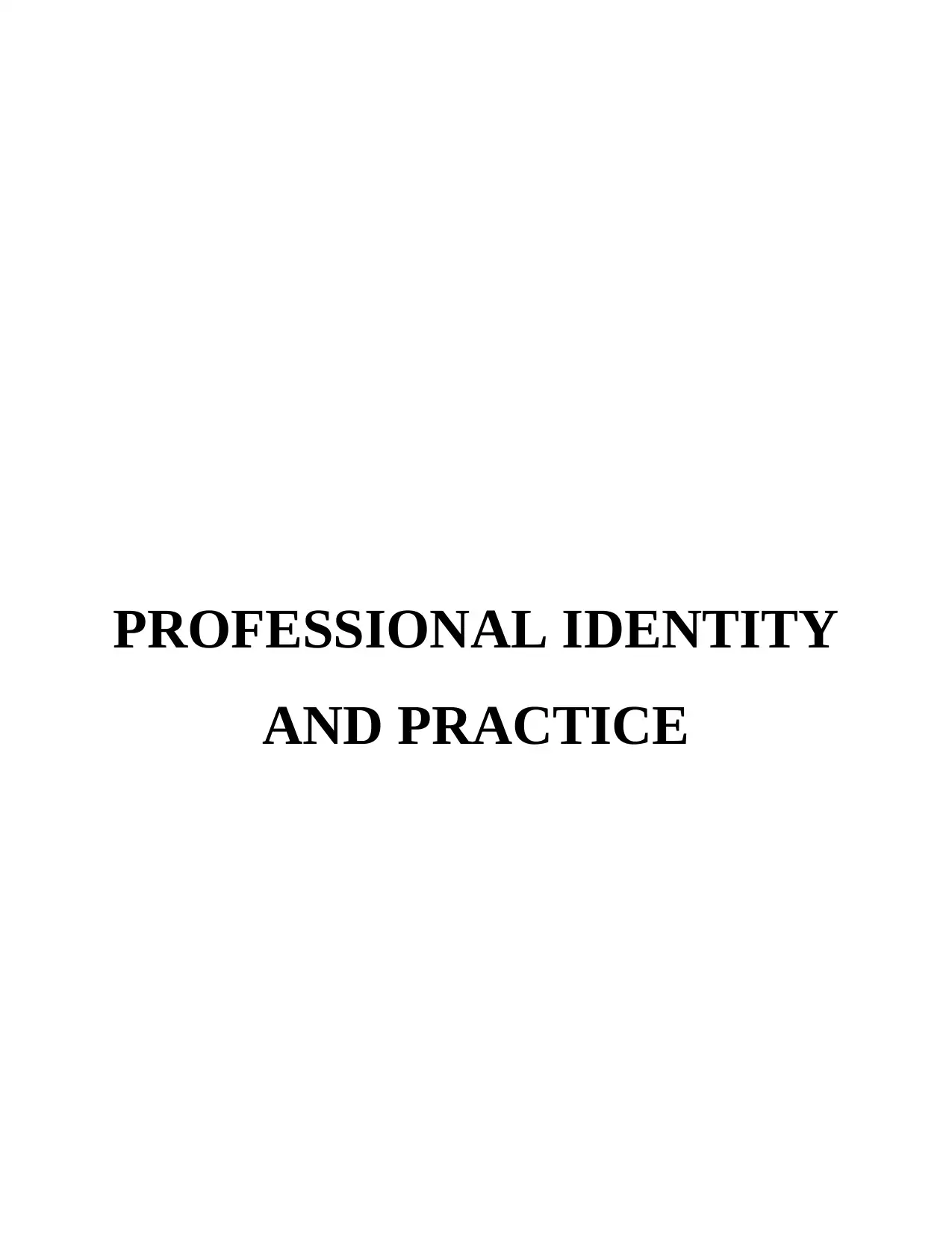
PROFESSIONAL IDENTITY
AND PRACTICE
AND PRACTICE
Paraphrase This Document
Need a fresh take? Get an instant paraphrase of this document with our AI Paraphraser
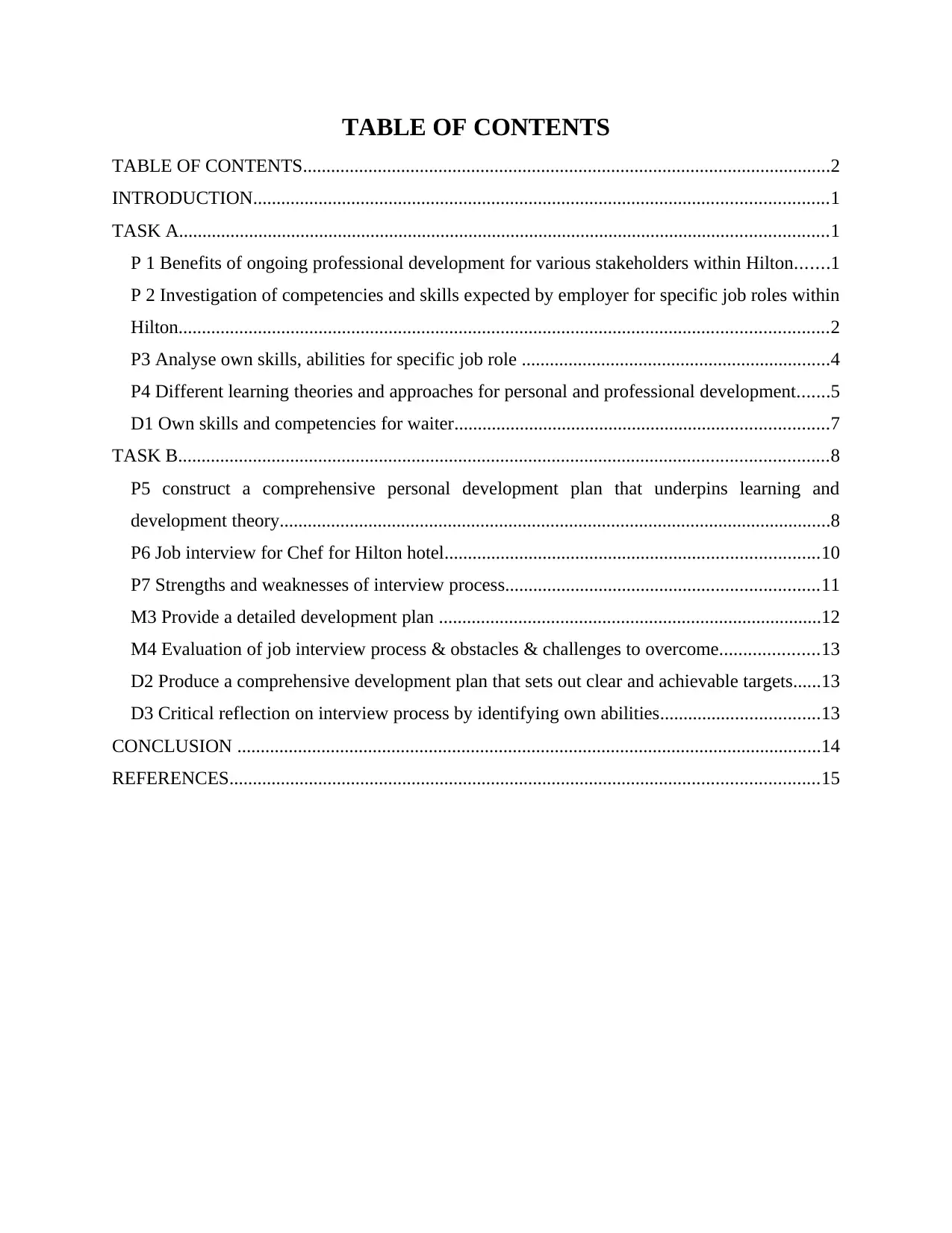
TABLE OF CONTENTS
TABLE OF CONTENTS.................................................................................................................2
INTRODUCTION...........................................................................................................................1
TASK A...........................................................................................................................................1
P 1 Benefits of ongoing professional development for various stakeholders within Hilton.......1
P 2 Investigation of competencies and skills expected by employer for specific job roles within
Hilton...........................................................................................................................................2
P3 Analyse own skills, abilities for specific job role ..................................................................4
P4 Different learning theories and approaches for personal and professional development.......5
D1 Own skills and competencies for waiter................................................................................7
TASK B...........................................................................................................................................8
P5 construct a comprehensive personal development plan that underpins learning and
development theory......................................................................................................................8
P6 Job interview for Chef for Hilton hotel................................................................................10
P7 Strengths and weaknesses of interview process...................................................................11
M3 Provide a detailed development plan ..................................................................................12
M4 Evaluation of job interview process & obstacles & challenges to overcome.....................13
D2 Produce a comprehensive development plan that sets out clear and achievable targets......13
D3 Critical reflection on interview process by identifying own abilities..................................13
CONCLUSION .............................................................................................................................14
REFERENCES..............................................................................................................................15
TABLE OF CONTENTS.................................................................................................................2
INTRODUCTION...........................................................................................................................1
TASK A...........................................................................................................................................1
P 1 Benefits of ongoing professional development for various stakeholders within Hilton.......1
P 2 Investigation of competencies and skills expected by employer for specific job roles within
Hilton...........................................................................................................................................2
P3 Analyse own skills, abilities for specific job role ..................................................................4
P4 Different learning theories and approaches for personal and professional development.......5
D1 Own skills and competencies for waiter................................................................................7
TASK B...........................................................................................................................................8
P5 construct a comprehensive personal development plan that underpins learning and
development theory......................................................................................................................8
P6 Job interview for Chef for Hilton hotel................................................................................10
P7 Strengths and weaknesses of interview process...................................................................11
M3 Provide a detailed development plan ..................................................................................12
M4 Evaluation of job interview process & obstacles & challenges to overcome.....................13
D2 Produce a comprehensive development plan that sets out clear and achievable targets......13
D3 Critical reflection on interview process by identifying own abilities..................................13
CONCLUSION .............................................................................................................................14
REFERENCES..............................................................................................................................15
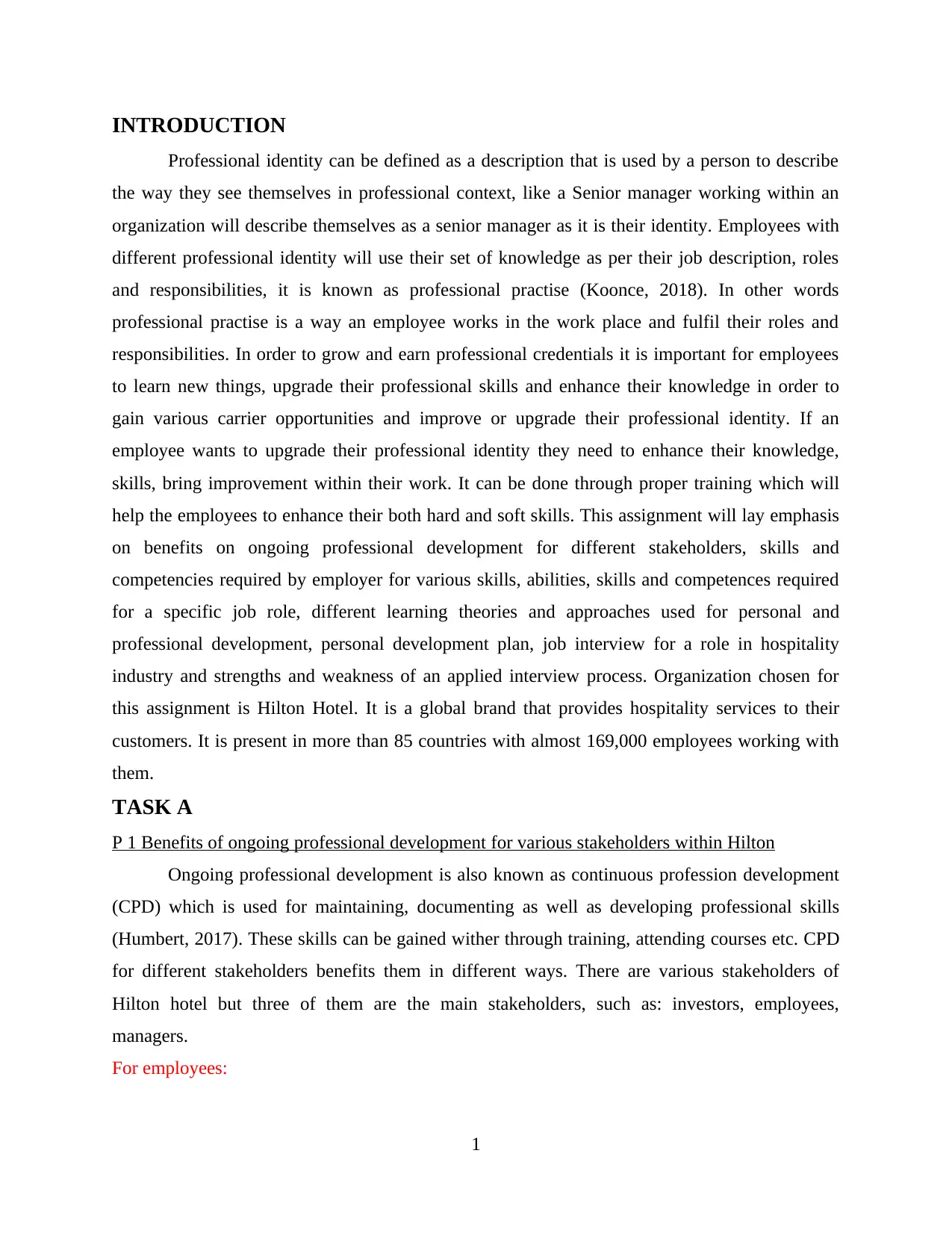
INTRODUCTION
Professional identity can be defined as a description that is used by a person to describe
the way they see themselves in professional context, like a Senior manager working within an
organization will describe themselves as a senior manager as it is their identity. Employees with
different professional identity will use their set of knowledge as per their job description, roles
and responsibilities, it is known as professional practise (Koonce, 2018). In other words
professional practise is a way an employee works in the work place and fulfil their roles and
responsibilities. In order to grow and earn professional credentials it is important for employees
to learn new things, upgrade their professional skills and enhance their knowledge in order to
gain various carrier opportunities and improve or upgrade their professional identity. If an
employee wants to upgrade their professional identity they need to enhance their knowledge,
skills, bring improvement within their work. It can be done through proper training which will
help the employees to enhance their both hard and soft skills. This assignment will lay emphasis
on benefits on ongoing professional development for different stakeholders, skills and
competencies required by employer for various skills, abilities, skills and competences required
for a specific job role, different learning theories and approaches used for personal and
professional development, personal development plan, job interview for a role in hospitality
industry and strengths and weakness of an applied interview process. Organization chosen for
this assignment is Hilton Hotel. It is a global brand that provides hospitality services to their
customers. It is present in more than 85 countries with almost 169,000 employees working with
them.
TASK A
P 1 Benefits of ongoing professional development for various stakeholders within Hilton
Ongoing professional development is also known as continuous profession development
(CPD) which is used for maintaining, documenting as well as developing professional skills
(Humbert, 2017). These skills can be gained wither through training, attending courses etc. CPD
for different stakeholders benefits them in different ways. There are various stakeholders of
Hilton hotel but three of them are the main stakeholders, such as: investors, employees,
managers.
For employees:
1
Professional identity can be defined as a description that is used by a person to describe
the way they see themselves in professional context, like a Senior manager working within an
organization will describe themselves as a senior manager as it is their identity. Employees with
different professional identity will use their set of knowledge as per their job description, roles
and responsibilities, it is known as professional practise (Koonce, 2018). In other words
professional practise is a way an employee works in the work place and fulfil their roles and
responsibilities. In order to grow and earn professional credentials it is important for employees
to learn new things, upgrade their professional skills and enhance their knowledge in order to
gain various carrier opportunities and improve or upgrade their professional identity. If an
employee wants to upgrade their professional identity they need to enhance their knowledge,
skills, bring improvement within their work. It can be done through proper training which will
help the employees to enhance their both hard and soft skills. This assignment will lay emphasis
on benefits on ongoing professional development for different stakeholders, skills and
competencies required by employer for various skills, abilities, skills and competences required
for a specific job role, different learning theories and approaches used for personal and
professional development, personal development plan, job interview for a role in hospitality
industry and strengths and weakness of an applied interview process. Organization chosen for
this assignment is Hilton Hotel. It is a global brand that provides hospitality services to their
customers. It is present in more than 85 countries with almost 169,000 employees working with
them.
TASK A
P 1 Benefits of ongoing professional development for various stakeholders within Hilton
Ongoing professional development is also known as continuous profession development
(CPD) which is used for maintaining, documenting as well as developing professional skills
(Humbert, 2017). These skills can be gained wither through training, attending courses etc. CPD
for different stakeholders benefits them in different ways. There are various stakeholders of
Hilton hotel but three of them are the main stakeholders, such as: investors, employees,
managers.
For employees:
1
⊘ This is a preview!⊘
Do you want full access?
Subscribe today to unlock all pages.

Trusted by 1+ million students worldwide
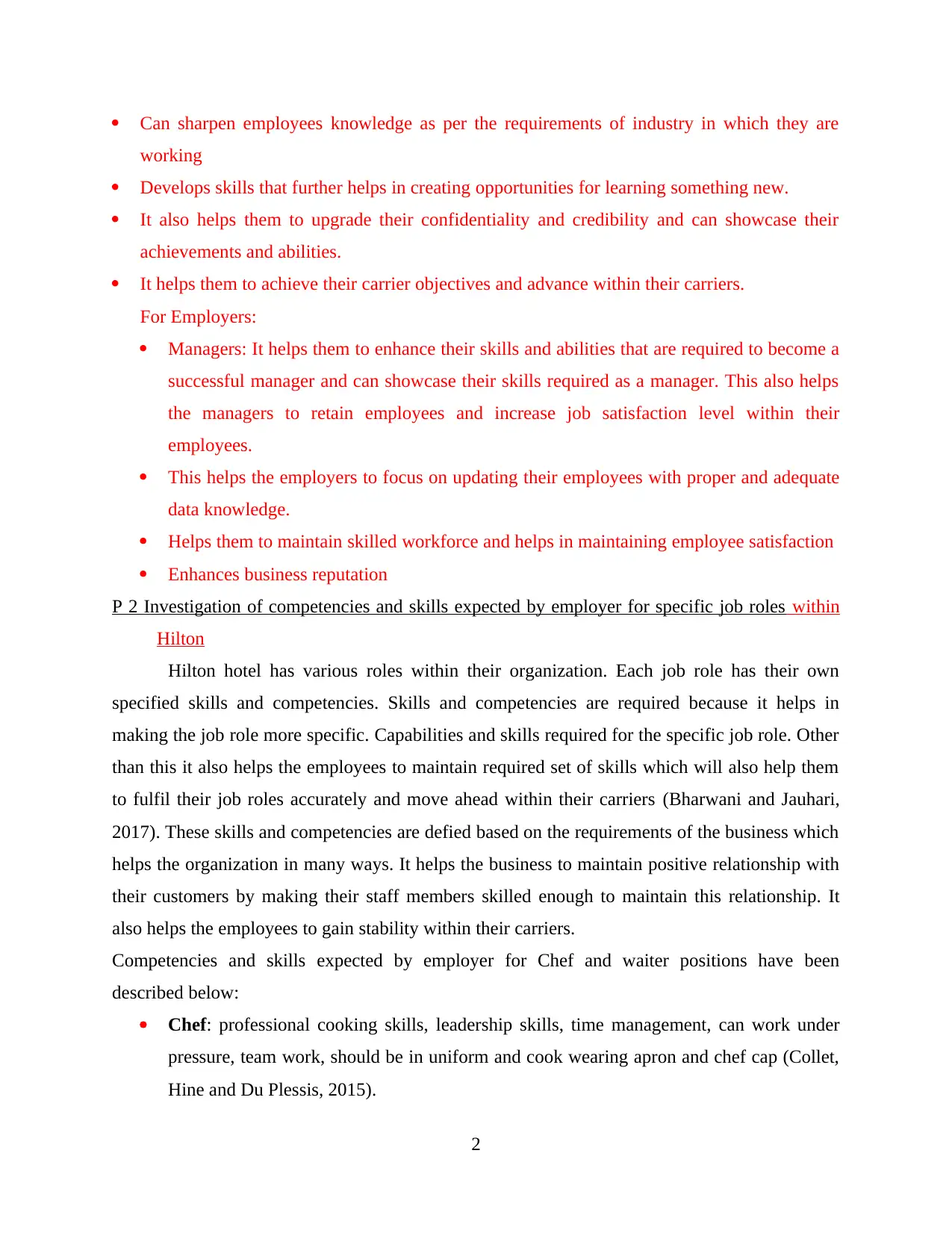
Can sharpen employees knowledge as per the requirements of industry in which they are
working
Develops skills that further helps in creating opportunities for learning something new.
It also helps them to upgrade their confidentiality and credibility and can showcase their
achievements and abilities.
It helps them to achieve their carrier objectives and advance within their carriers.
For Employers:
Managers: It helps them to enhance their skills and abilities that are required to become a
successful manager and can showcase their skills required as a manager. This also helps
the managers to retain employees and increase job satisfaction level within their
employees.
This helps the employers to focus on updating their employees with proper and adequate
data knowledge.
Helps them to maintain skilled workforce and helps in maintaining employee satisfaction
Enhances business reputation
P 2 Investigation of competencies and skills expected by employer for specific job roles within
Hilton
Hilton hotel has various roles within their organization. Each job role has their own
specified skills and competencies. Skills and competencies are required because it helps in
making the job role more specific. Capabilities and skills required for the specific job role. Other
than this it also helps the employees to maintain required set of skills which will also help them
to fulfil their job roles accurately and move ahead within their carriers (Bharwani and Jauhari,
2017). These skills and competencies are defied based on the requirements of the business which
helps the organization in many ways. It helps the business to maintain positive relationship with
their customers by making their staff members skilled enough to maintain this relationship. It
also helps the employees to gain stability within their carriers.
Competencies and skills expected by employer for Chef and waiter positions have been
described below:
Chef: professional cooking skills, leadership skills, time management, can work under
pressure, team work, should be in uniform and cook wearing apron and chef cap (Collet,
Hine and Du Plessis, 2015).
2
working
Develops skills that further helps in creating opportunities for learning something new.
It also helps them to upgrade their confidentiality and credibility and can showcase their
achievements and abilities.
It helps them to achieve their carrier objectives and advance within their carriers.
For Employers:
Managers: It helps them to enhance their skills and abilities that are required to become a
successful manager and can showcase their skills required as a manager. This also helps
the managers to retain employees and increase job satisfaction level within their
employees.
This helps the employers to focus on updating their employees with proper and adequate
data knowledge.
Helps them to maintain skilled workforce and helps in maintaining employee satisfaction
Enhances business reputation
P 2 Investigation of competencies and skills expected by employer for specific job roles within
Hilton
Hilton hotel has various roles within their organization. Each job role has their own
specified skills and competencies. Skills and competencies are required because it helps in
making the job role more specific. Capabilities and skills required for the specific job role. Other
than this it also helps the employees to maintain required set of skills which will also help them
to fulfil their job roles accurately and move ahead within their carriers (Bharwani and Jauhari,
2017). These skills and competencies are defied based on the requirements of the business which
helps the organization in many ways. It helps the business to maintain positive relationship with
their customers by making their staff members skilled enough to maintain this relationship. It
also helps the employees to gain stability within their carriers.
Competencies and skills expected by employer for Chef and waiter positions have been
described below:
Chef: professional cooking skills, leadership skills, time management, can work under
pressure, team work, should be in uniform and cook wearing apron and chef cap (Collet,
Hine and Du Plessis, 2015).
2
Paraphrase This Document
Need a fresh take? Get an instant paraphrase of this document with our AI Paraphraser
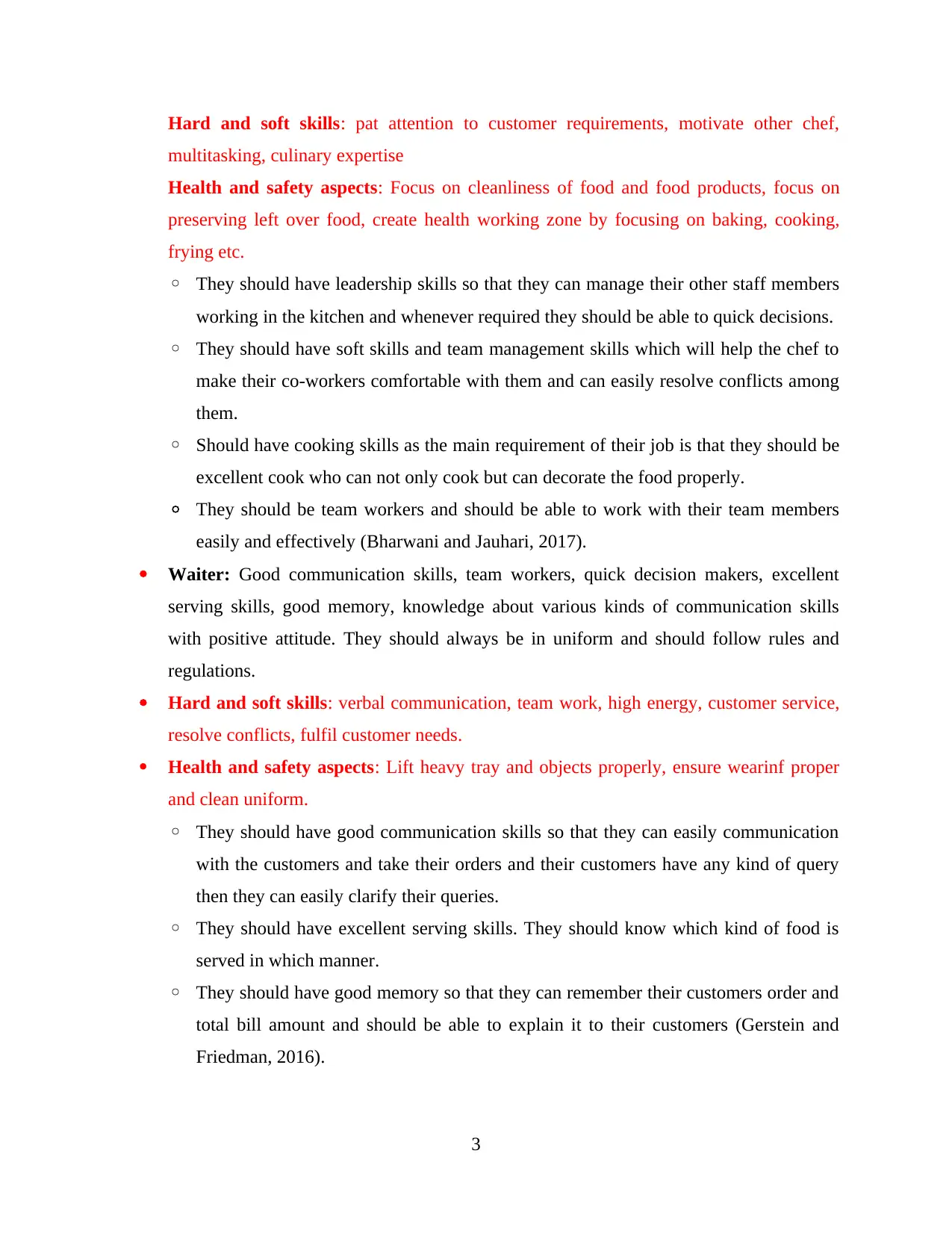
Hard and soft skills: pat attention to customer requirements, motivate other chef,
multitasking, culinary expertise
Health and safety aspects: Focus on cleanliness of food and food products, focus on
preserving left over food, create health working zone by focusing on baking, cooking,
frying etc.
◦ They should have leadership skills so that they can manage their other staff members
working in the kitchen and whenever required they should be able to quick decisions.
◦ They should have soft skills and team management skills which will help the chef to
make their co-workers comfortable with them and can easily resolve conflicts among
them.
◦ Should have cooking skills as the main requirement of their job is that they should be
excellent cook who can not only cook but can decorate the food properly.
◦ They should be team workers and should be able to work with their team members
easily and effectively (Bharwani and Jauhari, 2017).
Waiter: Good communication skills, team workers, quick decision makers, excellent
serving skills, good memory, knowledge about various kinds of communication skills
with positive attitude. They should always be in uniform and should follow rules and
regulations.
Hard and soft skills: verbal communication, team work, high energy, customer service,
resolve conflicts, fulfil customer needs.
Health and safety aspects: Lift heavy tray and objects properly, ensure wearinf proper
and clean uniform.
◦ They should have good communication skills so that they can easily communication
with the customers and take their orders and their customers have any kind of query
then they can easily clarify their queries.
◦ They should have excellent serving skills. They should know which kind of food is
served in which manner.
◦ They should have good memory so that they can remember their customers order and
total bill amount and should be able to explain it to their customers (Gerstein and
Friedman, 2016).
3
multitasking, culinary expertise
Health and safety aspects: Focus on cleanliness of food and food products, focus on
preserving left over food, create health working zone by focusing on baking, cooking,
frying etc.
◦ They should have leadership skills so that they can manage their other staff members
working in the kitchen and whenever required they should be able to quick decisions.
◦ They should have soft skills and team management skills which will help the chef to
make their co-workers comfortable with them and can easily resolve conflicts among
them.
◦ Should have cooking skills as the main requirement of their job is that they should be
excellent cook who can not only cook but can decorate the food properly.
◦ They should be team workers and should be able to work with their team members
easily and effectively (Bharwani and Jauhari, 2017).
Waiter: Good communication skills, team workers, quick decision makers, excellent
serving skills, good memory, knowledge about various kinds of communication skills
with positive attitude. They should always be in uniform and should follow rules and
regulations.
Hard and soft skills: verbal communication, team work, high energy, customer service,
resolve conflicts, fulfil customer needs.
Health and safety aspects: Lift heavy tray and objects properly, ensure wearinf proper
and clean uniform.
◦ They should have good communication skills so that they can easily communication
with the customers and take their orders and their customers have any kind of query
then they can easily clarify their queries.
◦ They should have excellent serving skills. They should know which kind of food is
served in which manner.
◦ They should have good memory so that they can remember their customers order and
total bill amount and should be able to explain it to their customers (Gerstein and
Friedman, 2016).
3
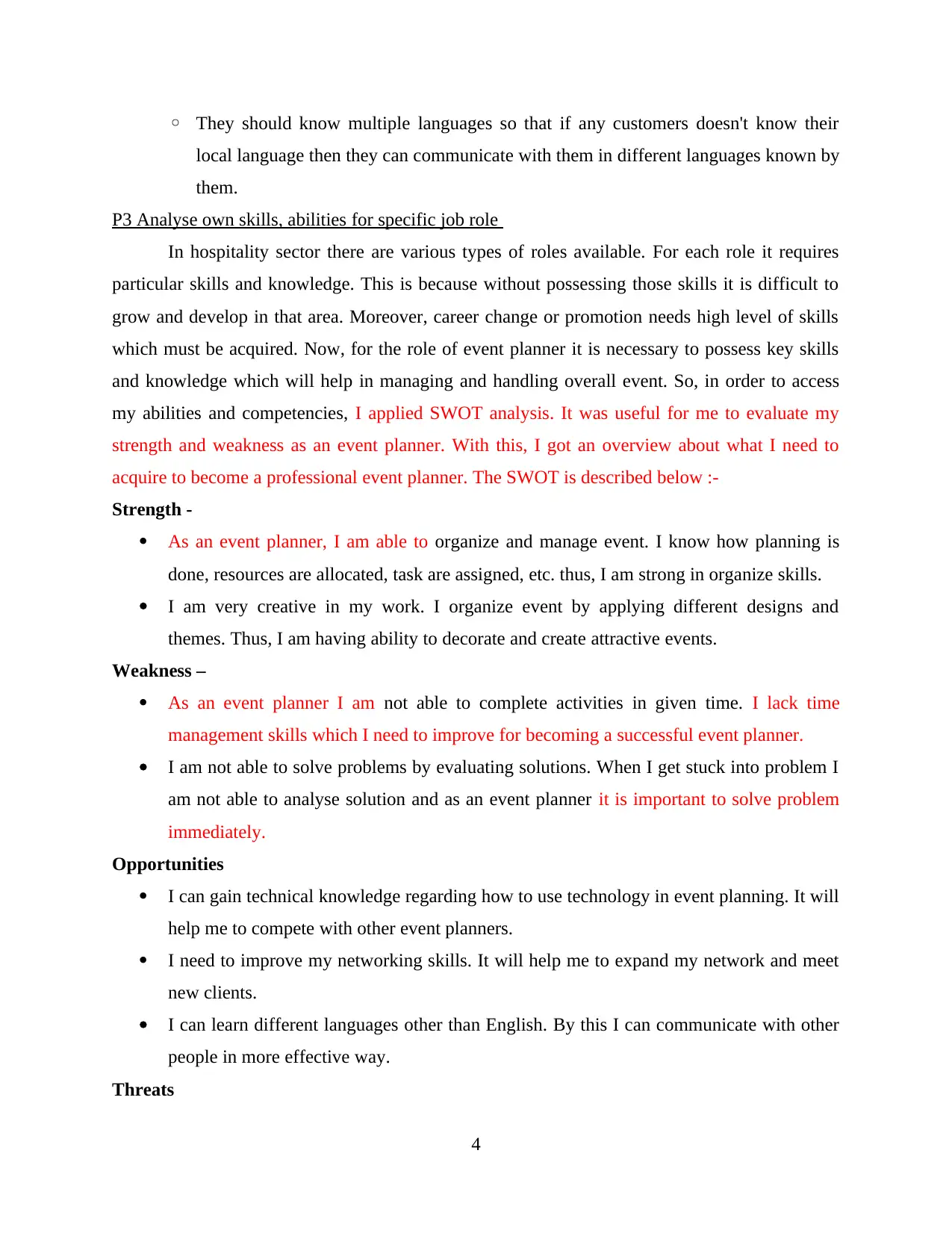
◦ They should know multiple languages so that if any customers doesn't know their
local language then they can communicate with them in different languages known by
them.
P3 Analyse own skills, abilities for specific job role
In hospitality sector there are various types of roles available. For each role it requires
particular skills and knowledge. This is because without possessing those skills it is difficult to
grow and develop in that area. Moreover, career change or promotion needs high level of skills
which must be acquired. Now, for the role of event planner it is necessary to possess key skills
and knowledge which will help in managing and handling overall event. So, in order to access
my abilities and competencies, I applied SWOT analysis. It was useful for me to evaluate my
strength and weakness as an event planner. With this, I got an overview about what I need to
acquire to become a professional event planner. The SWOT is described below :-
Strength -
As an event planner, I am able to organize and manage event. I know how planning is
done, resources are allocated, task are assigned, etc. thus, I am strong in organize skills.
I am very creative in my work. I organize event by applying different designs and
themes. Thus, I am having ability to decorate and create attractive events.
Weakness –
As an event planner I am not able to complete activities in given time. I lack time
management skills which I need to improve for becoming a successful event planner.
I am not able to solve problems by evaluating solutions. When I get stuck into problem I
am not able to analyse solution and as an event planner it is important to solve problem
immediately.
Opportunities
I can gain technical knowledge regarding how to use technology in event planning. It will
help me to compete with other event planners.
I need to improve my networking skills. It will help me to expand my network and meet
new clients.
I can learn different languages other than English. By this I can communicate with other
people in more effective way.
Threats
4
local language then they can communicate with them in different languages known by
them.
P3 Analyse own skills, abilities for specific job role
In hospitality sector there are various types of roles available. For each role it requires
particular skills and knowledge. This is because without possessing those skills it is difficult to
grow and develop in that area. Moreover, career change or promotion needs high level of skills
which must be acquired. Now, for the role of event planner it is necessary to possess key skills
and knowledge which will help in managing and handling overall event. So, in order to access
my abilities and competencies, I applied SWOT analysis. It was useful for me to evaluate my
strength and weakness as an event planner. With this, I got an overview about what I need to
acquire to become a professional event planner. The SWOT is described below :-
Strength -
As an event planner, I am able to organize and manage event. I know how planning is
done, resources are allocated, task are assigned, etc. thus, I am strong in organize skills.
I am very creative in my work. I organize event by applying different designs and
themes. Thus, I am having ability to decorate and create attractive events.
Weakness –
As an event planner I am not able to complete activities in given time. I lack time
management skills which I need to improve for becoming a successful event planner.
I am not able to solve problems by evaluating solutions. When I get stuck into problem I
am not able to analyse solution and as an event planner it is important to solve problem
immediately.
Opportunities
I can gain technical knowledge regarding how to use technology in event planning. It will
help me to compete with other event planners.
I need to improve my networking skills. It will help me to expand my network and meet
new clients.
I can learn different languages other than English. By this I can communicate with other
people in more effective way.
Threats
4
⊘ This is a preview!⊘
Do you want full access?
Subscribe today to unlock all pages.

Trusted by 1+ million students worldwide
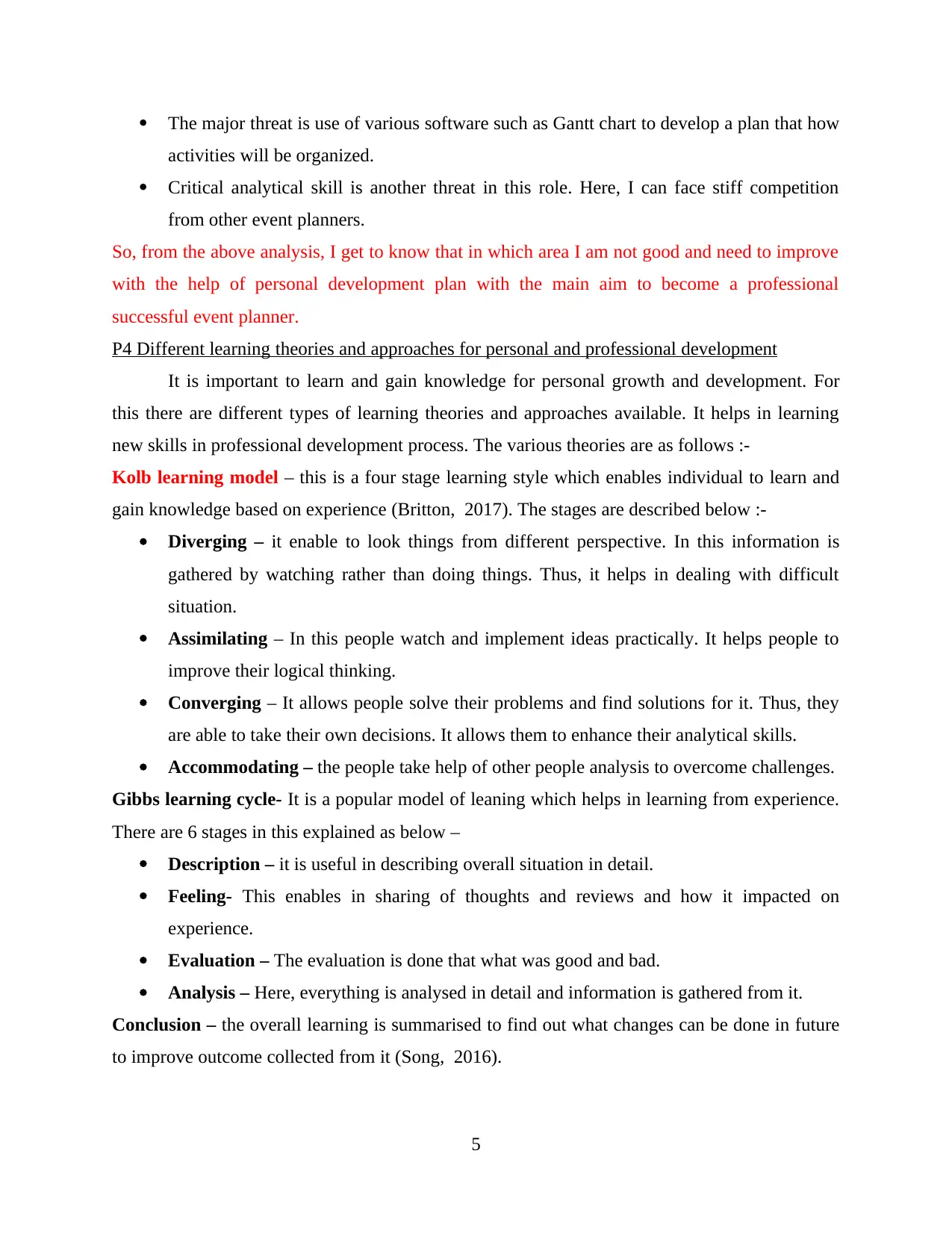
The major threat is use of various software such as Gantt chart to develop a plan that how
activities will be organized.
Critical analytical skill is another threat in this role. Here, I can face stiff competition
from other event planners.
So, from the above analysis, I get to know that in which area I am not good and need to improve
with the help of personal development plan with the main aim to become a professional
successful event planner.
P4 Different learning theories and approaches for personal and professional development
It is important to learn and gain knowledge for personal growth and development. For
this there are different types of learning theories and approaches available. It helps in learning
new skills in professional development process. The various theories are as follows :-
Kolb learning model – this is a four stage learning style which enables individual to learn and
gain knowledge based on experience (Britton, 2017). The stages are described below :-
Diverging – it enable to look things from different perspective. In this information is
gathered by watching rather than doing things. Thus, it helps in dealing with difficult
situation.
Assimilating – In this people watch and implement ideas practically. It helps people to
improve their logical thinking.
Converging – It allows people solve their problems and find solutions for it. Thus, they
are able to take their own decisions. It allows them to enhance their analytical skills.
Accommodating – the people take help of other people analysis to overcome challenges.
Gibbs learning cycle- It is a popular model of leaning which helps in learning from experience.
There are 6 stages in this explained as below –
Description – it is useful in describing overall situation in detail.
Feeling- This enables in sharing of thoughts and reviews and how it impacted on
experience.
Evaluation – The evaluation is done that what was good and bad.
Analysis – Here, everything is analysed in detail and information is gathered from it.
Conclusion – the overall learning is summarised to find out what changes can be done in future
to improve outcome collected from it (Song, 2016).
5
activities will be organized.
Critical analytical skill is another threat in this role. Here, I can face stiff competition
from other event planners.
So, from the above analysis, I get to know that in which area I am not good and need to improve
with the help of personal development plan with the main aim to become a professional
successful event planner.
P4 Different learning theories and approaches for personal and professional development
It is important to learn and gain knowledge for personal growth and development. For
this there are different types of learning theories and approaches available. It helps in learning
new skills in professional development process. The various theories are as follows :-
Kolb learning model – this is a four stage learning style which enables individual to learn and
gain knowledge based on experience (Britton, 2017). The stages are described below :-
Diverging – it enable to look things from different perspective. In this information is
gathered by watching rather than doing things. Thus, it helps in dealing with difficult
situation.
Assimilating – In this people watch and implement ideas practically. It helps people to
improve their logical thinking.
Converging – It allows people solve their problems and find solutions for it. Thus, they
are able to take their own decisions. It allows them to enhance their analytical skills.
Accommodating – the people take help of other people analysis to overcome challenges.
Gibbs learning cycle- It is a popular model of leaning which helps in learning from experience.
There are 6 stages in this explained as below –
Description – it is useful in describing overall situation in detail.
Feeling- This enables in sharing of thoughts and reviews and how it impacted on
experience.
Evaluation – The evaluation is done that what was good and bad.
Analysis – Here, everything is analysed in detail and information is gathered from it.
Conclusion – the overall learning is summarised to find out what changes can be done in future
to improve outcome collected from it (Song, 2016).
5
Paraphrase This Document
Need a fresh take? Get an instant paraphrase of this document with our AI Paraphraser
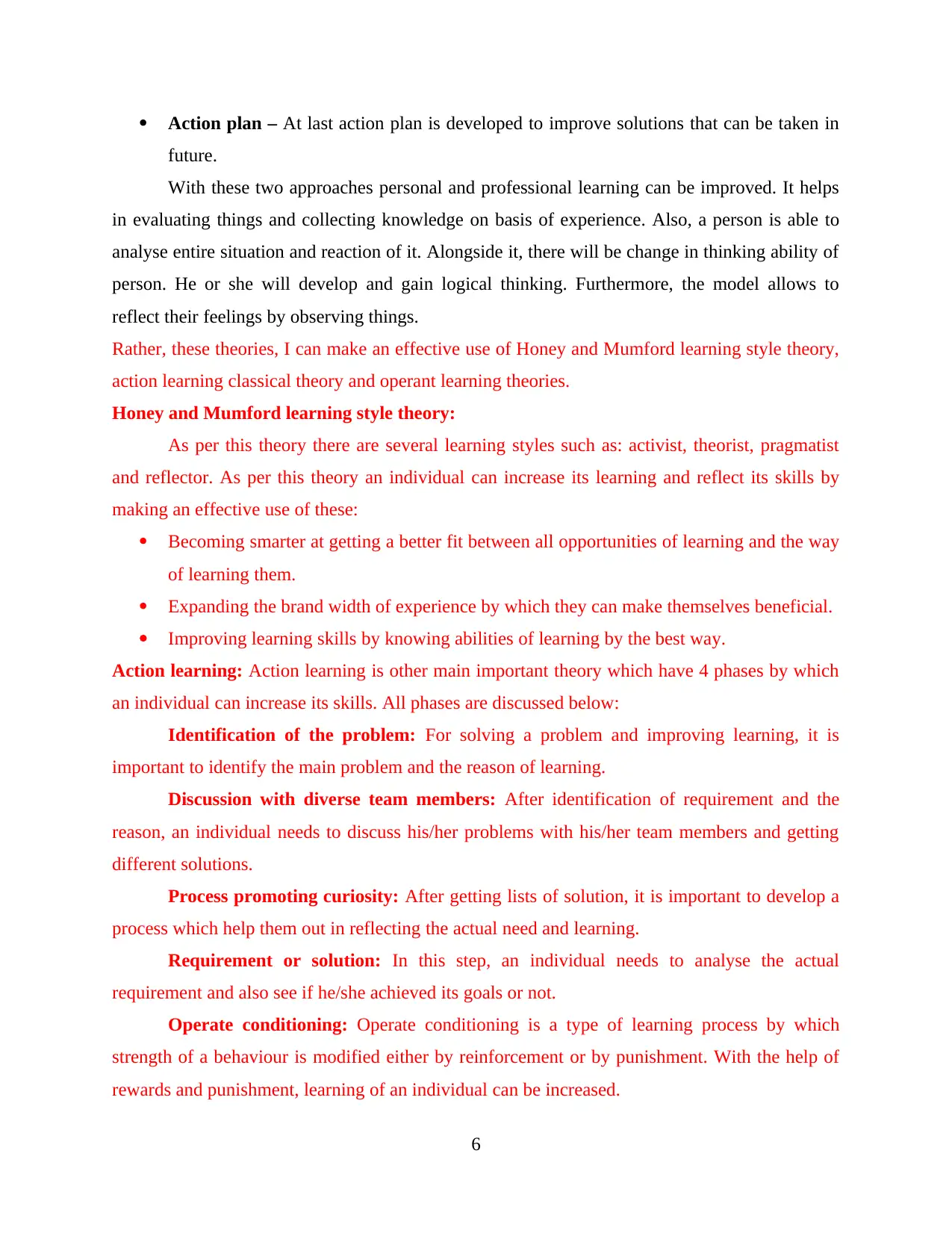
Action plan – At last action plan is developed to improve solutions that can be taken in
future.
With these two approaches personal and professional learning can be improved. It helps
in evaluating things and collecting knowledge on basis of experience. Also, a person is able to
analyse entire situation and reaction of it. Alongside it, there will be change in thinking ability of
person. He or she will develop and gain logical thinking. Furthermore, the model allows to
reflect their feelings by observing things.
Rather, these theories, I can make an effective use of Honey and Mumford learning style theory,
action learning classical theory and operant learning theories.
Honey and Mumford learning style theory:
As per this theory there are several learning styles such as: activist, theorist, pragmatist
and reflector. As per this theory an individual can increase its learning and reflect its skills by
making an effective use of these:
Becoming smarter at getting a better fit between all opportunities of learning and the way
of learning them.
Expanding the brand width of experience by which they can make themselves beneficial.
Improving learning skills by knowing abilities of learning by the best way.
Action learning: Action learning is other main important theory which have 4 phases by which
an individual can increase its skills. All phases are discussed below:
Identification of the problem: For solving a problem and improving learning, it is
important to identify the main problem and the reason of learning.
Discussion with diverse team members: After identification of requirement and the
reason, an individual needs to discuss his/her problems with his/her team members and getting
different solutions.
Process promoting curiosity: After getting lists of solution, it is important to develop a
process which help them out in reflecting the actual need and learning.
Requirement or solution: In this step, an individual needs to analyse the actual
requirement and also see if he/she achieved its goals or not.
Operate conditioning: Operate conditioning is a type of learning process by which
strength of a behaviour is modified either by reinforcement or by punishment. With the help of
rewards and punishment, learning of an individual can be increased.
6
future.
With these two approaches personal and professional learning can be improved. It helps
in evaluating things and collecting knowledge on basis of experience. Also, a person is able to
analyse entire situation and reaction of it. Alongside it, there will be change in thinking ability of
person. He or she will develop and gain logical thinking. Furthermore, the model allows to
reflect their feelings by observing things.
Rather, these theories, I can make an effective use of Honey and Mumford learning style theory,
action learning classical theory and operant learning theories.
Honey and Mumford learning style theory:
As per this theory there are several learning styles such as: activist, theorist, pragmatist
and reflector. As per this theory an individual can increase its learning and reflect its skills by
making an effective use of these:
Becoming smarter at getting a better fit between all opportunities of learning and the way
of learning them.
Expanding the brand width of experience by which they can make themselves beneficial.
Improving learning skills by knowing abilities of learning by the best way.
Action learning: Action learning is other main important theory which have 4 phases by which
an individual can increase its skills. All phases are discussed below:
Identification of the problem: For solving a problem and improving learning, it is
important to identify the main problem and the reason of learning.
Discussion with diverse team members: After identification of requirement and the
reason, an individual needs to discuss his/her problems with his/her team members and getting
different solutions.
Process promoting curiosity: After getting lists of solution, it is important to develop a
process which help them out in reflecting the actual need and learning.
Requirement or solution: In this step, an individual needs to analyse the actual
requirement and also see if he/she achieved its goals or not.
Operate conditioning: Operate conditioning is a type of learning process by which
strength of a behaviour is modified either by reinforcement or by punishment. With the help of
rewards and punishment, learning of an individual can be increased.
6
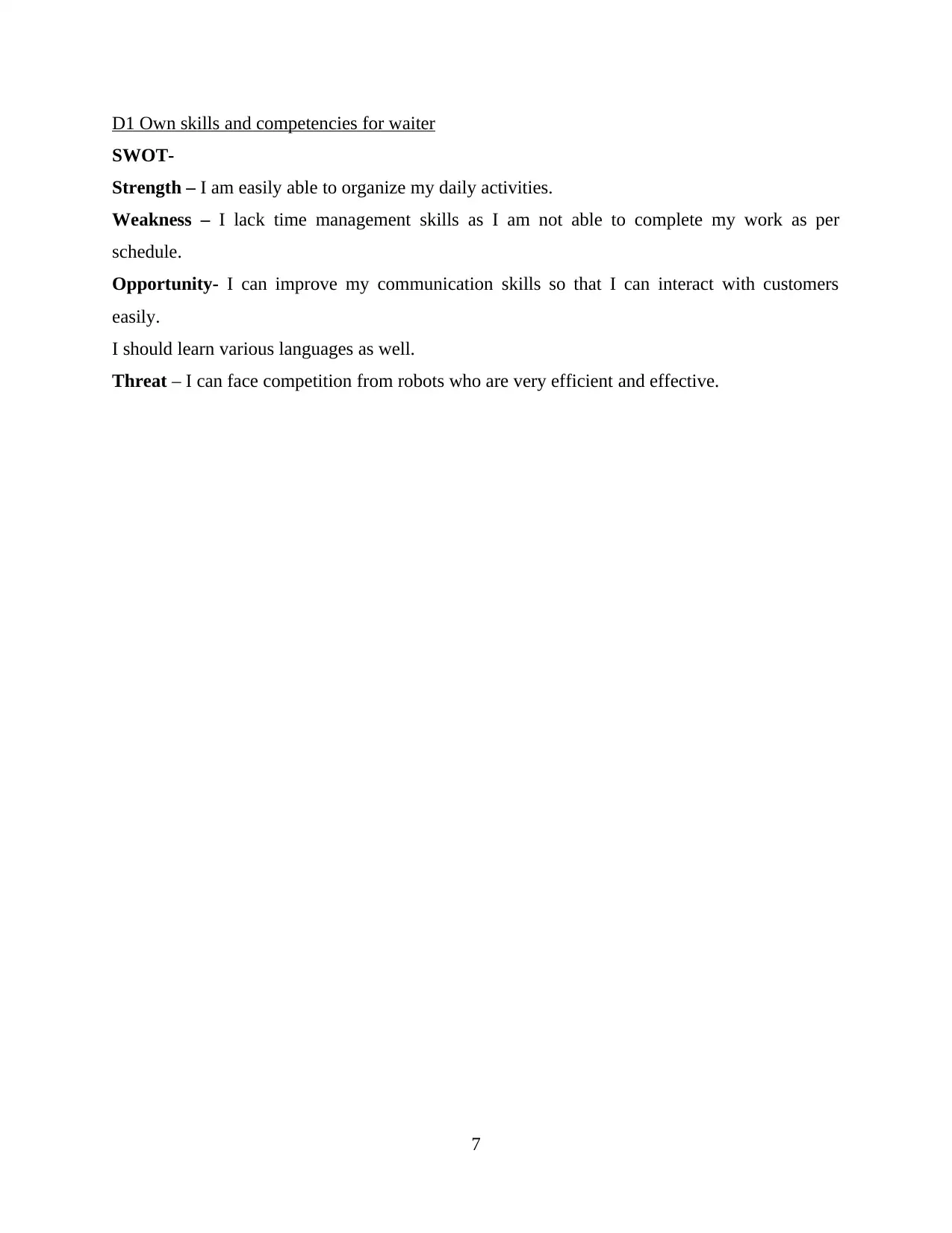
D1 Own skills and competencies for waiter
SWOT-
Strength – I am easily able to organize my daily activities.
Weakness – I lack time management skills as I am not able to complete my work as per
schedule.
Opportunity- I can improve my communication skills so that I can interact with customers
easily.
I should learn various languages as well.
Threat – I can face competition from robots who are very efficient and effective.
7
SWOT-
Strength – I am easily able to organize my daily activities.
Weakness – I lack time management skills as I am not able to complete my work as per
schedule.
Opportunity- I can improve my communication skills so that I can interact with customers
easily.
I should learn various languages as well.
Threat – I can face competition from robots who are very efficient and effective.
7
⊘ This is a preview!⊘
Do you want full access?
Subscribe today to unlock all pages.

Trusted by 1+ million students worldwide
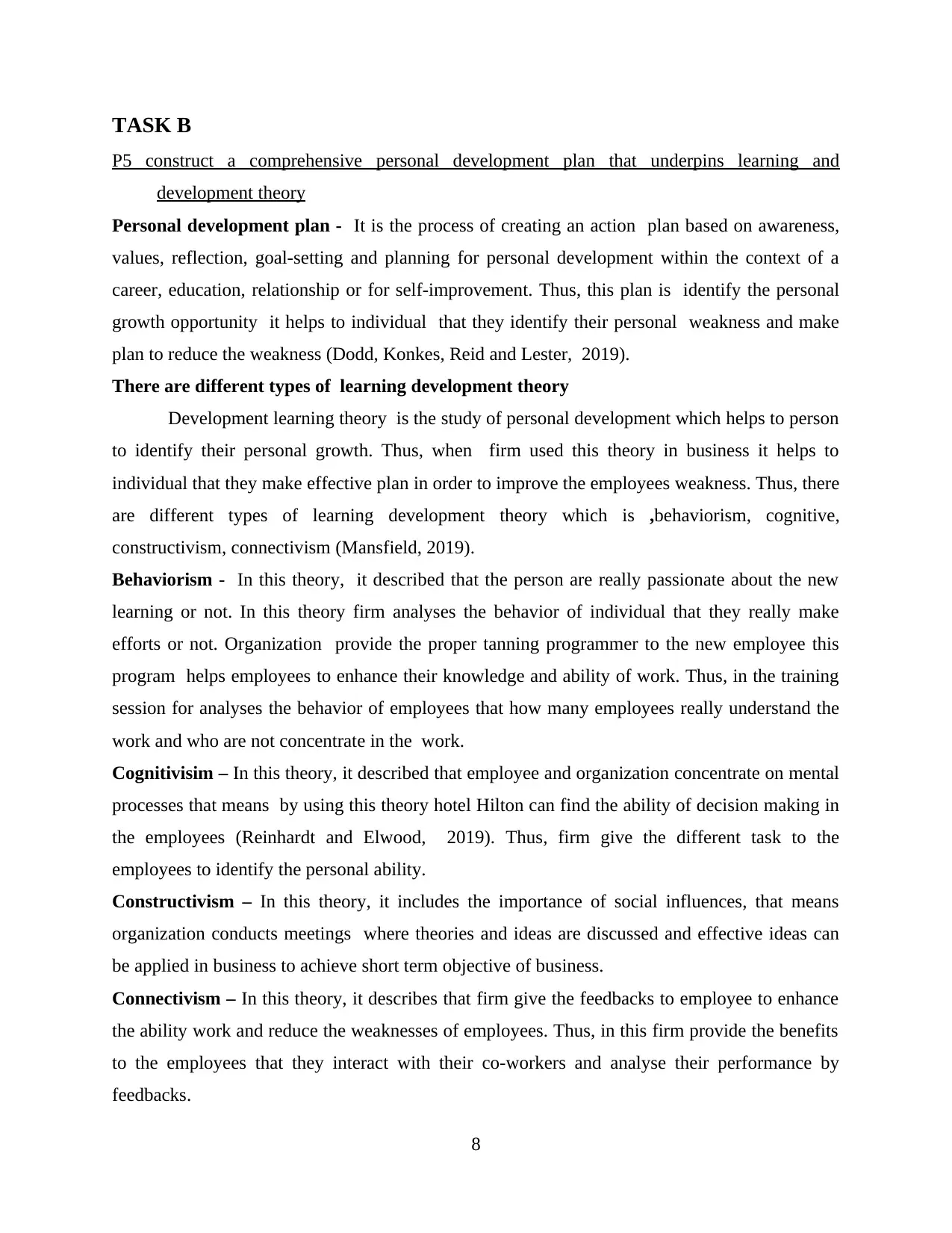
TASK B
P5 construct a comprehensive personal development plan that underpins learning and
development theory
Personal development plan - It is the process of creating an action plan based on awareness,
values, reflection, goal-setting and planning for personal development within the context of a
career, education, relationship or for self-improvement. Thus, this plan is identify the personal
growth opportunity it helps to individual that they identify their personal weakness and make
plan to reduce the weakness (Dodd, Konkes, Reid and Lester, 2019).
There are different types of learning development theory
Development learning theory is the study of personal development which helps to person
to identify their personal growth. Thus, when firm used this theory in business it helps to
individual that they make effective plan in order to improve the employees weakness. Thus, there
are different types of learning development theory which is ,behaviorism, cognitive,
constructivism, connectivism (Mansfield, 2019).
Behaviorism - In this theory, it described that the person are really passionate about the new
learning or not. In this theory firm analyses the behavior of individual that they really make
efforts or not. Organization provide the proper tanning programmer to the new employee this
program helps employees to enhance their knowledge and ability of work. Thus, in the training
session for analyses the behavior of employees that how many employees really understand the
work and who are not concentrate in the work.
Cognitivisim – In this theory, it described that employee and organization concentrate on mental
processes that means by using this theory hotel Hilton can find the ability of decision making in
the employees (Reinhardt and Elwood, 2019). Thus, firm give the different task to the
employees to identify the personal ability.
Constructivism – In this theory, it includes the importance of social influences, that means
organization conducts meetings where theories and ideas are discussed and effective ideas can
be applied in business to achieve short term objective of business.
Connectivism – In this theory, it describes that firm give the feedbacks to employee to enhance
the ability work and reduce the weaknesses of employees. Thus, in this firm provide the benefits
to the employees that they interact with their co-workers and analyse their performance by
feedbacks.
8
P5 construct a comprehensive personal development plan that underpins learning and
development theory
Personal development plan - It is the process of creating an action plan based on awareness,
values, reflection, goal-setting and planning for personal development within the context of a
career, education, relationship or for self-improvement. Thus, this plan is identify the personal
growth opportunity it helps to individual that they identify their personal weakness and make
plan to reduce the weakness (Dodd, Konkes, Reid and Lester, 2019).
There are different types of learning development theory
Development learning theory is the study of personal development which helps to person
to identify their personal growth. Thus, when firm used this theory in business it helps to
individual that they make effective plan in order to improve the employees weakness. Thus, there
are different types of learning development theory which is ,behaviorism, cognitive,
constructivism, connectivism (Mansfield, 2019).
Behaviorism - In this theory, it described that the person are really passionate about the new
learning or not. In this theory firm analyses the behavior of individual that they really make
efforts or not. Organization provide the proper tanning programmer to the new employee this
program helps employees to enhance their knowledge and ability of work. Thus, in the training
session for analyses the behavior of employees that how many employees really understand the
work and who are not concentrate in the work.
Cognitivisim – In this theory, it described that employee and organization concentrate on mental
processes that means by using this theory hotel Hilton can find the ability of decision making in
the employees (Reinhardt and Elwood, 2019). Thus, firm give the different task to the
employees to identify the personal ability.
Constructivism – In this theory, it includes the importance of social influences, that means
organization conducts meetings where theories and ideas are discussed and effective ideas can
be applied in business to achieve short term objective of business.
Connectivism – In this theory, it describes that firm give the feedbacks to employee to enhance
the ability work and reduce the weaknesses of employees. Thus, in this firm provide the benefits
to the employees that they interact with their co-workers and analyse their performance by
feedbacks.
8
Paraphrase This Document
Need a fresh take? Get an instant paraphrase of this document with our AI Paraphraser
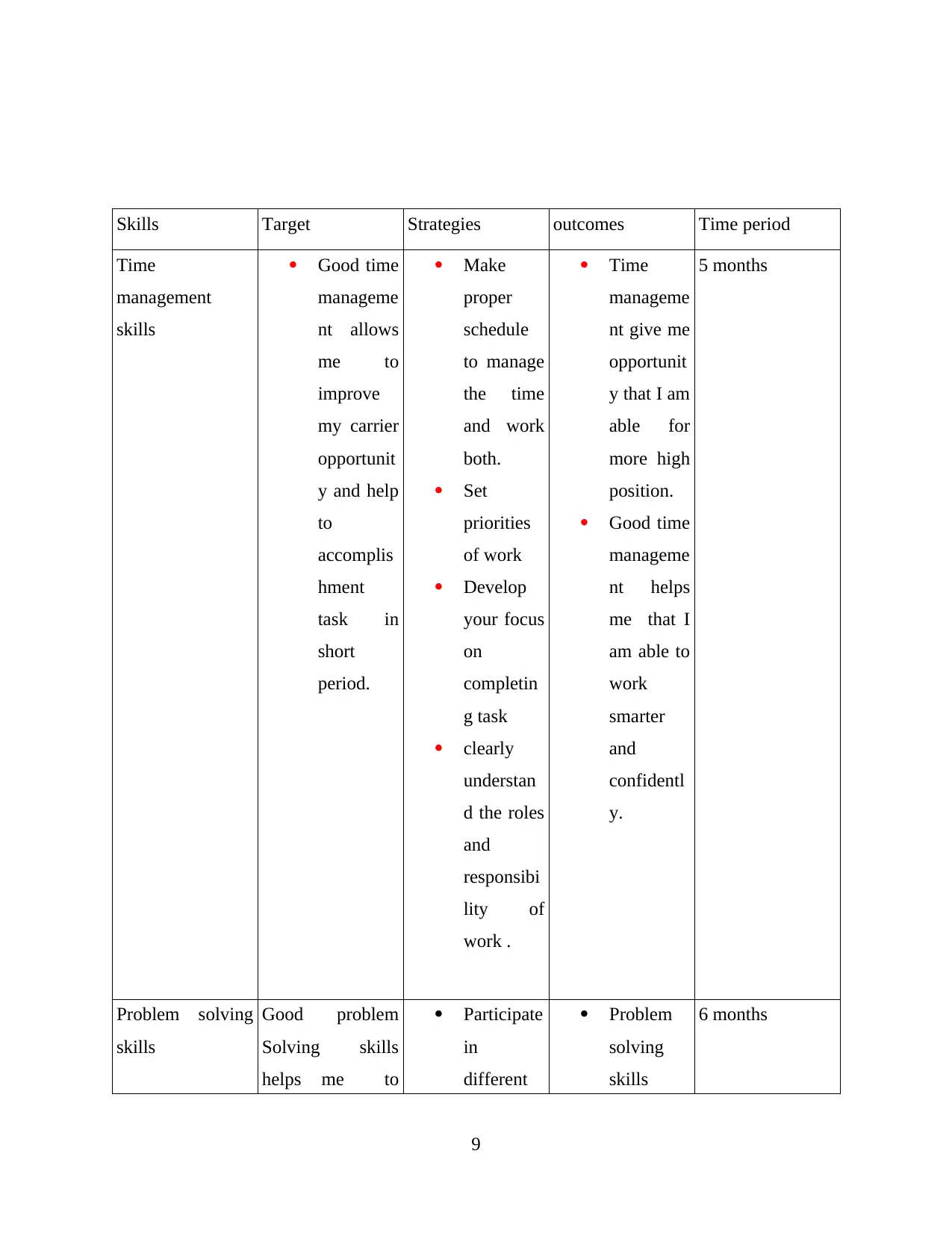
Skills Target Strategies outcomes Time period
Time
management
skills
Good time
manageme
nt allows
me to
improve
my carrier
opportunit
y and help
to
accomplis
hment
task in
short
period.
Make
proper
schedule
to manage
the time
and work
both.
Set
priorities
of work
Develop
your focus
on
completin
g task
clearly
understan
d the roles
and
responsibi
lity of
work .
Time
manageme
nt give me
opportunit
y that I am
able for
more high
position.
Good time
manageme
nt helps
me that I
am able to
work
smarter
and
confidentl
y.
5 months
Problem solving
skills
Good problem
Solving skills
helps me to
Participate
in
different
Problem
solving
skills
6 months
9
Time
management
skills
Good time
manageme
nt allows
me to
improve
my carrier
opportunit
y and help
to
accomplis
hment
task in
short
period.
Make
proper
schedule
to manage
the time
and work
both.
Set
priorities
of work
Develop
your focus
on
completin
g task
clearly
understan
d the roles
and
responsibi
lity of
work .
Time
manageme
nt give me
opportunit
y that I am
able for
more high
position.
Good time
manageme
nt helps
me that I
am able to
work
smarter
and
confidentl
y.
5 months
Problem solving
skills
Good problem
Solving skills
helps me to
Participate
in
different
Problem
solving
skills
6 months
9
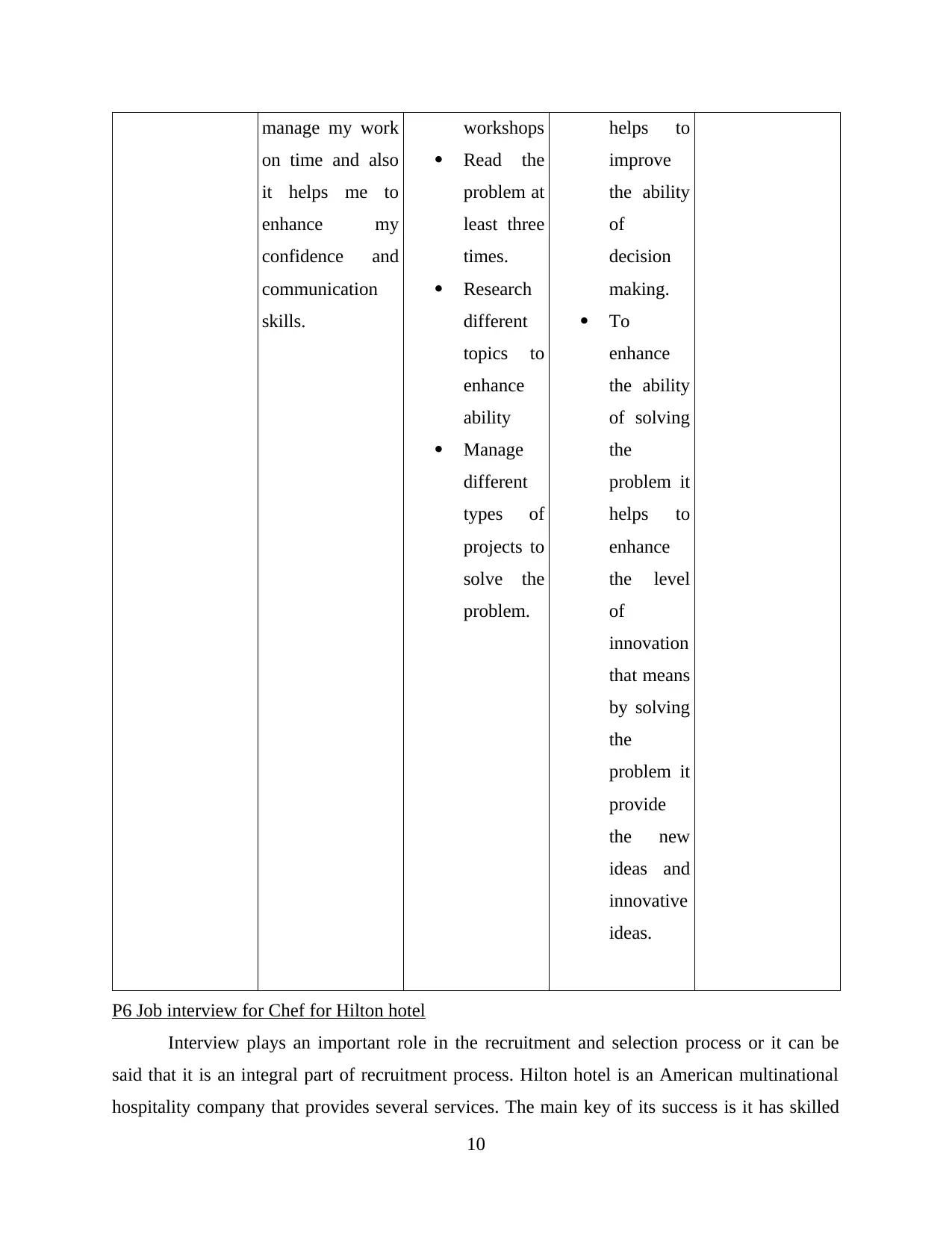
manage my work
on time and also
it helps me to
enhance my
confidence and
communication
skills.
workshops
Read the
problem at
least three
times.
Research
different
topics to
enhance
ability
Manage
different
types of
projects to
solve the
problem.
helps to
improve
the ability
of
decision
making.
To
enhance
the ability
of solving
the
problem it
helps to
enhance
the level
of
innovation
that means
by solving
the
problem it
provide
the new
ideas and
innovative
ideas.
P6 Job interview for Chef for Hilton hotel
Interview plays an important role in the recruitment and selection process or it can be
said that it is an integral part of recruitment process. Hilton hotel is an American multinational
hospitality company that provides several services. The main key of its success is it has skilled
10
on time and also
it helps me to
enhance my
confidence and
communication
skills.
workshops
Read the
problem at
least three
times.
Research
different
topics to
enhance
ability
Manage
different
types of
projects to
solve the
problem.
helps to
improve
the ability
of
decision
making.
To
enhance
the ability
of solving
the
problem it
helps to
enhance
the level
of
innovation
that means
by solving
the
problem it
provide
the new
ideas and
innovative
ideas.
P6 Job interview for Chef for Hilton hotel
Interview plays an important role in the recruitment and selection process or it can be
said that it is an integral part of recruitment process. Hilton hotel is an American multinational
hospitality company that provides several services. The main key of its success is it has skilled
10
⊘ This is a preview!⊘
Do you want full access?
Subscribe today to unlock all pages.

Trusted by 1+ million students worldwide
1 out of 18
Related Documents
Your All-in-One AI-Powered Toolkit for Academic Success.
+13062052269
info@desklib.com
Available 24*7 on WhatsApp / Email
![[object Object]](/_next/static/media/star-bottom.7253800d.svg)
Unlock your academic potential
Copyright © 2020–2026 A2Z Services. All Rights Reserved. Developed and managed by ZUCOL.





